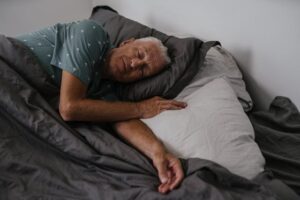A strategy developed by Canadian researchers for encouraging older patients with insomnia to wean themselves from sleeping pills and improve their sleep through behavioral techniques is effective, data suggest. If proven helpful for the millions of older Canadians who currently rely on nightly benzodiazepines (BZDs) and non-BZDs (colloquially known as Z drugs) for their sleep, it might yield an additional benefit: Reducing resource utilization.
“We know that cognitive behavioral therapy for insomnia (CBTI) works. It’s recommended as first-line therapy because it works,” study author David Gardner, PharmD, professor of psychiatry at Dalhousie University in Halifax, Nova Scotia, Canada, said.
“We’re sharing information about sleeping pills, information that has been embedded with behavior-change techniques that lead people to second-guess or rethink their long-term use of sedative hypnotics and then bring that information to their provider or pharmacist to discuss it,” he said.
Gardner and his team created a direct-to-patient, patient-directed, multicomponent knowledge mobilization intervention called Sleepwell. It incorporates best practice– and guideline-based evidence and multiple behavioral change techniques with content and graphics. Gardner emphasized that it represents a directional shift in care that alleviates providers’ burden without removing it entirely.
To test the intervention’s effectiveness, Gardner and his team chose New Brunswick as a location for a 6-month, 3-arm open-label randomized controlled trial; the province has one of the highest rates of sedative use and an older adult population that is vulnerable to the serious side effects of these drugs (eg, cognitive impairment, falls, and frailty). The study was called Your Answers When Needing Sleep in New Brunswick (YAWNS NB).
The intervention is intended to help patients “change their approach from sleeping pills to a short-term CBTI course for long-term sleep benefits, and to work with their provider during this process,” said Gardner.
He pointed to a post-study follow-up of the study participants’ health providers, most of whom had moderate to extensive experience deprescribing BZRAs, which showed that 87.5%-100% fully or nearly fully agreed with or supported using the Sleepwell strategy and its content with older patients who rely on sedatives.
“Providers said that deprescribing is difficult, time-consuming, and often not a productive use of their time,” said Gardner. “I see insomnia as a health issue well set up for a stepped-care model. Self-help approaches are at the very bottom of that model and can help shift the initial burden to patients and out of the healthcare system.”








